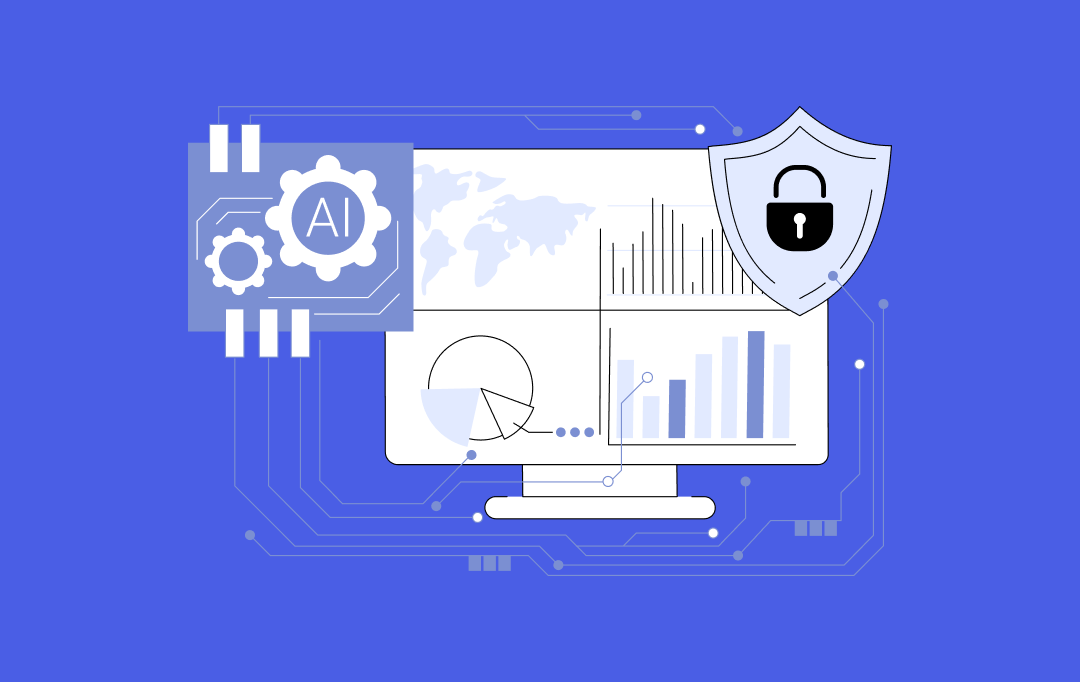- Why Do AI Agents Deserve a Spot on Your 2025 Strategy Roadmap?
- Why AI Agents in Digital Transformation Are Key to Shaping the Future of Businesses Across the Middle East?
- Strengthening Cybersecurity and Compliance
- Supporting Workforce Transformation and Upskilling
- Driving Sustainability and Resource Optimization
- Enhancing Customer Personalization and Engagement
- Facilitating Cross-Industry Collaboration
- Use Cases and Real-World Examples of AI Agents in the Middle East
- 1. Customer Service Automation
- 2. Fraud Detection and Risk Management
- 3. Supply Chain and Logistics Optimization
- 4. Healthcare Support and Diagnostics
- 5. Personalized Marketing and Sales
- 6. Government Service Automation
- Step-by-Step Guide to Build an AI Agent
- 1. Identify Clear Business Objectives and Use Cases
- 2. Assess Data Availability and Quality
- 3. Select the Right AI Models and Architectures
- 4. Develop the AI Agent
- 5. Test and Validate the AI Agent
- 6. Design User-Centric Interfaces and Experiences
- 7. Implement Strong Security and Compliance Measures
- 8. Deploy Incrementally with Continuous Monitoring
- 9. Plan for Maintenance and Future Upgrades
- Cost to Build an AI Agent for Your Business in the Middle East
- Challenges in Developing AI Agents and How to Overcome Them
- 1. Data Privacy and Regulatory Compliance
- 2. Limited High-Quality Data
- 3. Integration Complexities
- 4. Cultural and Language Nuances
- 5. Talent Shortage and Skill Gaps
- 6. Ensuring Scalability and Reliability
- AI Agent Implementation Strategies for Seamless Business Integration
- Define Clear Business Objectives
- Start with Pilot Projects
- Ensure Data Readiness
- Adopt Modular and Scalable Architectures
- Prioritize User-Centric Design
- Plan for Human-AI Collaboration
- Implement Strong Security and Compliance Measures
- Develop a Continuous Learning and Improvement Loop
- Invest in Employee Training and Change Management
- Partner with Experienced AI Development Firms
- Future Trends Redefining the Power of AI Agents Across the Middle East
- 2. Multimodal Interaction Capabilities
- 3. Integration with Internet of Things (IoT)
- 4. Ethical AI and Transparent Decision-Making
- 5. Hyper-Personalization at Scale
- 6. Collaborative AI Agents Working Alongside Humans
- How Appinventiv is the Right Partner for Developing an AI Agent that Offers It All
- FAQs
Key takeaways:
- AI agents are being adopted across the Middle East to automate workflows, support real-time decision-making, and enable intelligent service delivery at scale.
- Industries including finance, healthcare, logistics, retail, and government are implementing agent-based systems to improve efficiency, reduce operational overhead, and enhance customer experiences.
- Successful AI agent deployment requires clearly defined use cases, structured datasets, scalable infrastructure, and compliance with regional data and AI regulations.
- AI agent development costs typically range from $50,000 to $250,000+, depending on system complexity, integration depth, and enterprise requirements.
- Emerging trends include autonomous task agents, IoT-connected agents, hyper-personalized interactions, and collaborative human-AI workflows.
AI agents for digital transformation in the Middle East are enabling organizations to automate operations, enhance decision-making, and deliver scalable intelligent services across industries. Enterprises and government entities in the region are adopting AI agents to improve efficiency, reduce operational costs, support multilingual interactions, and accelerate data-driven workflows.
This guide explains how AI agents are used across sectors in the Middle East, the implementation requirements organizations must consider, development cost ranges, and the strategic factors decision-makers should evaluate before deploying agent-based systems.
Why Do AI Agents Deserve a Spot on Your 2025 Strategy Roadmap?
In the Middle East, where digital growth is a top priority, AI agents are becoming essential. They help businesses stay competitive, support national goals such as Vision 2030, and drive long-term success. AI agents are set to change how businesses work, collaborate, and grow completely. These smart systems do more than just automate tasks—they help improve entire workflows, making companies faster, smarter, and more productive.
Wondering why?
Well, let’s look at some of the key statistics below:
- According to Grand View Research, the UAE’s AI agents market was valued at $ 67.6 million in 2024 and is expected to reach $722.8 million by 2030, growing at a CAGR of 49.4% from 2025 to 2030.
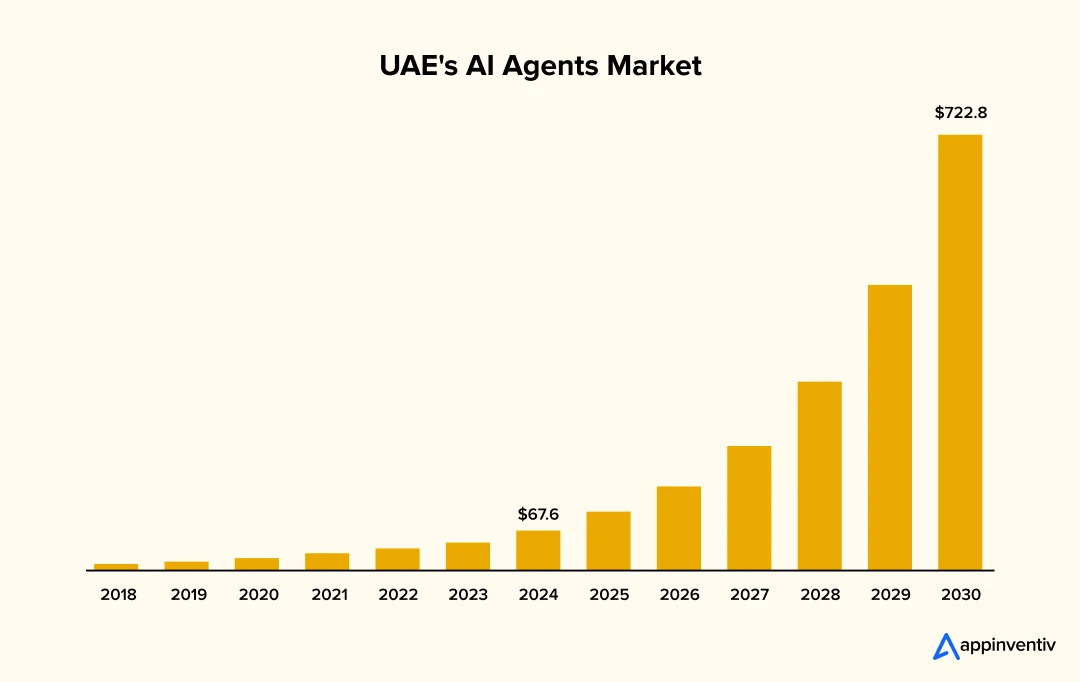
- As per the PwC’s AI Agent Survey, 66% of companies adopting AI agents report increased productivity, 57% report cost savings, and 55% experience faster decision-making. Furthermore, 73% of business leaders also agree that how they use AI agents will give them a significant competitive advantage in the coming 12 months.
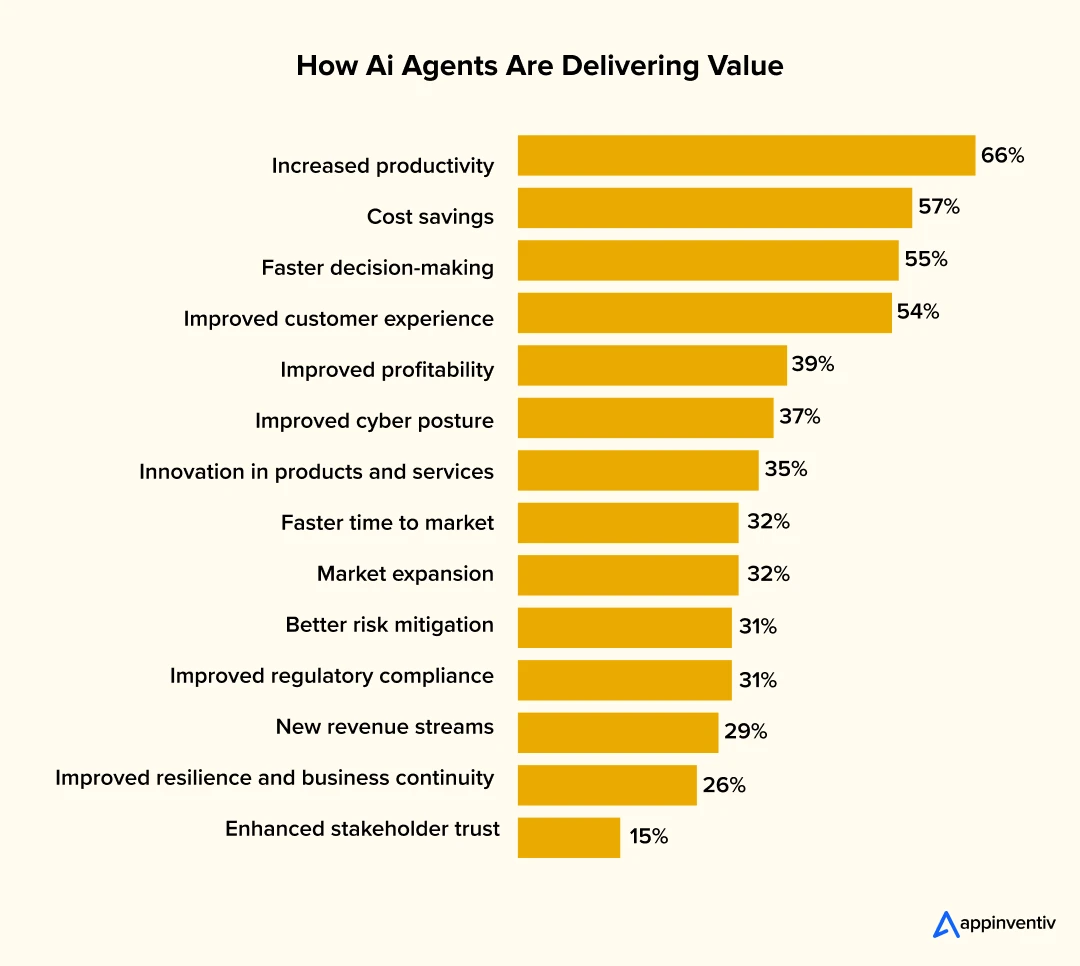
According to a McKinsey report, by the end of 2025, AI agents will be able to converse independently with users, process payments, detect fraud, and complete shipping workflows without human intervention.
A Deloitte report predicts that 25% of enterprises using Generative AI are expected to deploy AI agents by the end of 2025, with this figure growing to 50% by 2027. In addition to this, the report also suggests that investors have poured over $2 billion into agentic AI startups in the past two years, with a focus on companies targeting the enterprise market.
These developments as well as the AI agent market growth in the Middle East point to a future where agentic AI will not only assist but autonomously act, reason, and execute. For businesses in the MENA region, this is more than just a technological shift; it is a strategic evolution. As AI agents move beyond their narrow capabilities to become context-aware decision-makers, companies that invest early are positioning themselves to rewire how they operate, serve, and grow fundamentally.
Why AI Agents in Digital Transformation Are Key to Shaping the Future of Businesses Across the Middle East?
The Middle East is rapidly evolving into a hub for digital innovation, and at the center of this transformation are artificial intelligence (AI) agents. Beyond strategy and statistics, adopting AI agents is about preparing your business for the future — a future where agility, speed, and intelligent automation will define market leaders.
AI-powered automation in the Middle East is rapidly becoming the foundation for improving business efficiency, reducing costs, and accelerating digital transformation across sectors.
This shift is crucial in a region where rapid growth necessitates scalable solutions that can accommodate diverse markets and evolving customer expectations, making AI implementation in business a vital part of the digital transformation journey.
With this understanding, let’s explore the key benefits AI agents bring and why they should be an integral part of your growth and innovation strategy.
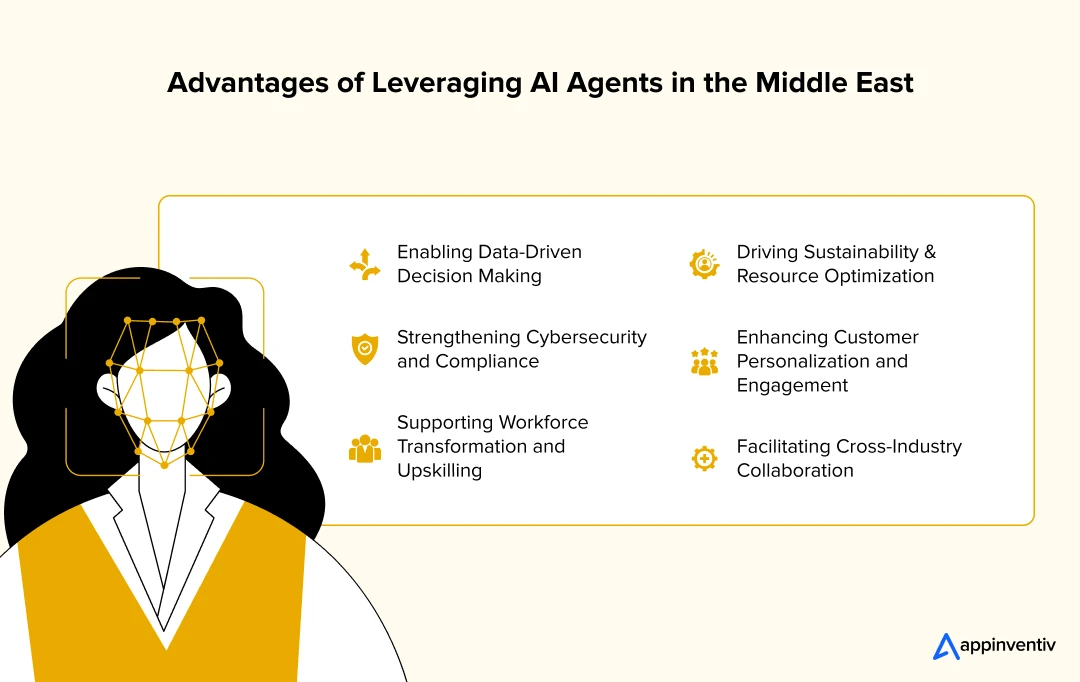 Enabling Data-Driven Decision Making
Enabling Data-Driven Decision Making
AI agents analyze large volumes of data in real-time and provide actionable insights. This empowers leaders to make faster, smarter decisions, which is vital for staying agile in today’s competitive markets.
Strengthening Cybersecurity and Compliance
As digital adoption increases, so do cybersecurity risks. AI agents continuously monitor systems to detect threats early, ensuring compliance with regulatory standards and protecting sensitive information, thereby maintaining trust.
Supporting Workforce Transformation and Upskilling
Upskilling, supporting AI workforce integration, and driving overall workforce transformation are key benefits of employing AI agents in the Middle East. By automating repetitive tasks, AI agents free employees to focus on more complex and creative work. This shift encourages upskilling and builds a workforce that is prepared for the future of work.
Driving Sustainability and Resource Optimization
An AI-powered workforce in the Middle East, backed by AI agents, optimizes the use of resources such as energy and logistics, helping organizations reduce costs while supporting regional sustainability goals and lowering their environmental impact.
This approach increasingly converges with IoT-powered smart grid systems in the Middle East, which provide the real-time data infrastructure needed for deeper energy efficiency and operational insight. When piloting agentic solutions, evaluate the managed IT services ROI to compare in-house versus managed operational models.
[Also Read: AI in the UAE Energy Sector: A Timely Necessity – Exploring the Why and the How]
Enhancing Customer Personalization and Engagement
AI agents can analyze customer behavior and preferences to deliver highly personalized experiences. This leads to stronger customer relationships, improved satisfaction, and increased loyalty—key factors in competitive markets.
Facilitating Cross-Industry Collaboration
AI agents enable seamless data sharing and collaboration across different industries and departments. This interconnectedness fosters innovation, drives efficiency, and supports the development of integrated solutions tailored to complex regional challenges.
With a clear understanding of the strategic benefits of AI agents for businesses, it’s important to see how these advantages play out in real business scenarios. The next section will explore practical use cases and real-world examples of AI agents used in Middle Eastern companies, highlighting their transformative power.
Also Read: Creating Hyper-Personalized Banking with AI: Cost, ROI, and Use Case
Use Cases and Real-World Examples of AI Agents in the Middle East
From improving customer service to optimizing supply chains, AI agents are making a tangible difference across sectors. Let’s dive into some concrete examples that showcase how businesses and governments in the Middle East are leveraging AI agents to drive innovation and efficiency.
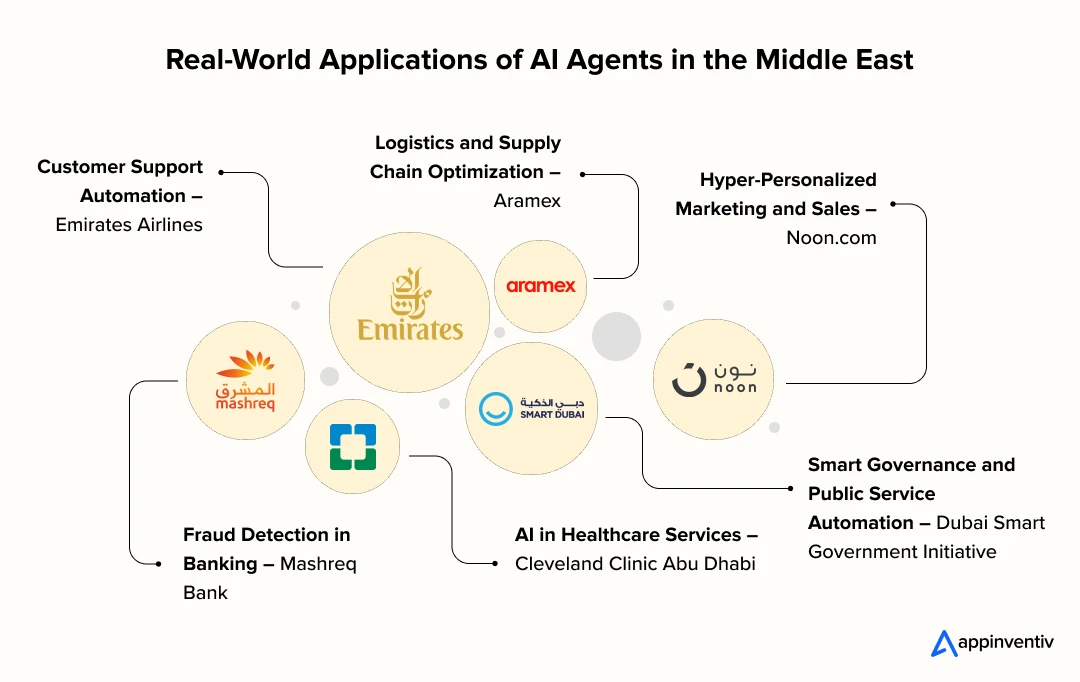
1. Customer Service Automation
AI agents handle routine customer queries, provide 24/7 support, and resolve issues quickly, improving response times and customer satisfaction. This reduces the workload on human agents and ensures consistent service quality.
They can seamlessly integrate with CRM tools, track past interactions, and learn from user behavior to offer smarter responses over time. This not only enhances user experience but also significantly reduces operational support costs.
[Also Read: How to create an AI-powered customer service platform like Zendesk?]
Example: Emirates Airlines utilizes AI-powered chatbots to handle customer inquiries across multiple languages, providing instant support for booking, flight status, and baggage information. Their AI assistant “Emma” helps improve customer experience while reducing call center volumes.
2. Fraud Detection and Risk Management
AI agents monitor transactions and identify suspicious activity in real-time, helping financial institutions reduce fraud and comply with regulatory requirements more effectively.
They continuously learn from evolving fraud patterns, enabling predictive alerts before actual damage occurs. This helps build trust, ensures data security, and maintains compliance in high-risk environments.
Example: Mashreq Bank in the UAE is one of the major examples of firms using AI agents in digital transformation. They employ the agent to analyze transaction data and detect fraudulent activities. Their AI system helps protect customers and minimize financial losses, enhancing security in banking operations.
3. Supply Chain and Logistics Optimization
One of the major AI agents business use cases in the Middle East is supply chain and logistics optimization. They simply streamline inventory management, predict demand, and optimize delivery routes, reducing operational costs and improving efficiency in complex supply chains.
These agents also enable real-time tracking, proactive rerouting based on traffic or weather, and predictive maintenance for fleet vehicles. The result is reduced delays, enhanced transparency, and better resource utilization.
Example: Aramex, a leading logistics company based in Dubai, uses AI-driven agents to optimize route planning and delivery schedules, improving parcel tracking and reducing shipping times across the Middle East.
[Also Read: AI innovations in Dubai – How Emiratis are pioneering a new era of possibilities]
4. Healthcare Support and Diagnostics
AI agents assist medical professionals by analyzing patient data, scheduling appointments, and providing diagnostic recommendations, resulting in faster and more accurate healthcare delivery.
They also help monitor chronic conditions remotely, personalize treatment plans, and triage patient cases based on urgency, improving the overall healthcare ecosystem’s responsiveness and quality.
Example: Cleveland Clinic Abu Dhabi integrates AI agents into its patient management systems to improve diagnostics and streamline appointment bookings, enhancing overall patient care efficiency.
5. Personalized Marketing and Sales
AI agents analyze customer behavior and preferences to deliver targeted marketing campaigns and personalized product recommendations, driving sales and customer loyalty.
They adapt to real-time user interactions, optimize conversion funnels, and run A/B testing autonomously, making marketing more data-driven and effective at scale.
Example: Noon.com, a major e-commerce platform in the Middle East, uses AI agents to personalize shopping experiences by recommending products based on user preferences and browsing history, boosting conversion rates.
6. Government Service Automation
AI agents help governments provide faster, more accessible, and personalized public services, from licensing to citizen engagement, improving transparency and efficiency.
They support multilingual interactions, automate form processing, and provide real-time updates to citizens, making governance more inclusive, responsive, and citizen-centric.
[Also Read: AI in Government: How Nations Are Embracing Intelligent Transformation]
Example: Dubai’s Smart Government initiative uses AI agents to automate several public services like visa processing and bill payments, allowing residents to access services conveniently online 24/7.
After looking into the various use cases of AI agents in digital transformation, let us move forward and understand in detail the AI agent development steps.
Step-by-Step Guide to Build an AI Agent
Building AI agents in the Middle East requires careful planning, the right technology, and a clear understanding of your business needs. Following a structured approach can help ensure your AI agent is effective, secure, and aligned with your goals. Here are the effective steps to develop an AI agent for your company:
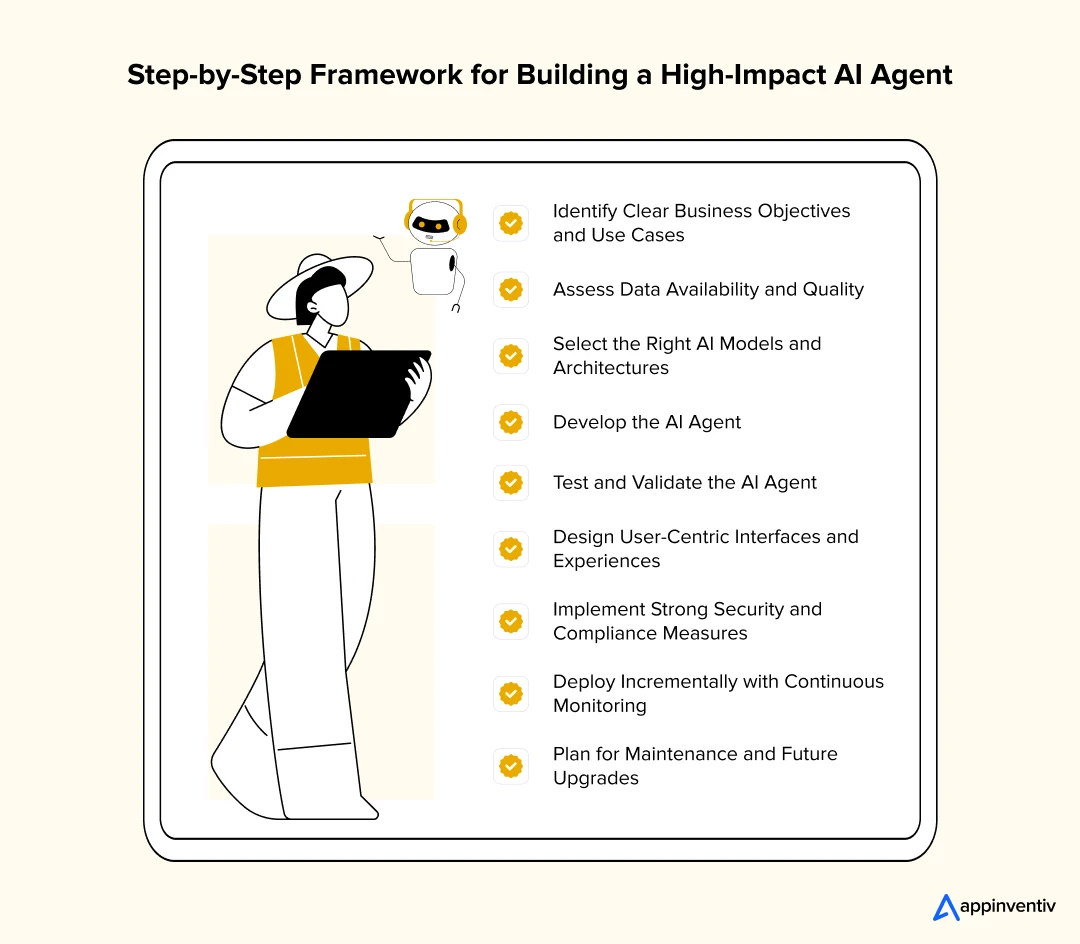
1. Identify Clear Business Objectives and Use Cases
Begin by working closely with stakeholders to define the exact business challenges the AI agent will address. Prioritize use cases of AI-driven workflow automation, based on impact and feasibility, ensuring alignment with your company’s strategic goals. This clarity guides the entire development process and sets measurable success criteria.
2. Assess Data Availability and Quality
AI agents depend heavily on data. Evaluate your existing data sources for relevance, volume, and cleanliness. Often, data needs to be enriched or labeled to train the agent effectively. Establish data governance policies to maintain quality and comply with regional regulations like data privacy laws.
3. Select the Right AI Models and Architectures
Choose AI models tailored to your agent’s tasks—whether natural language processing for conversational agents or reinforcement learning for decision-making. Consider modular architectures that pave an easy way for integrating AI agents into existing systems and enable scalability as your business grows.
4. Develop the AI Agent
Build and train the AI model using your selected algorithms and prepared data. This phase involves coding, configuring machine learning models, and integrating various components to create a functional AI agent aligned with business requirements.
5. Test and Validate the AI Agent
Use rigorous validation techniques including A/B testing and real-world scenario simulations to ensure reliability, accuracy, and user acceptance. Testing identifies gaps and performance issues before deployment, enabling iterative improvements.
6. Design User-Centric Interfaces and Experiences
The success of AI transforming the workforce in the Middle East depends on seamless interaction. Develop interfaces that suit your users—chatbots, voice assistants, or integrated dashboards—prioritizing clarity, responsiveness, and contextual understanding to foster user trust and adoption.
7. Implement Strong Security and Compliance Measures
Security is critical, especially in regulated industries common in the Middle East. Embed encryption, access controls, and audit trails within the AI agent’s framework. Ensure compliance with local laws such as GDPR-equivalent regulations and sector-specific standards.
8. Deploy Incrementally with Continuous Monitoring
During this phase of building AI agents for digital transformation in UAE, roll out your product in phases, starting with pilot programs to gather user feedback and identify gaps. Monitor key performance indicators (KPIs) in real-time and establish a feedback loop for ongoing enhancements, enabling the agent to adapt to evolving business needs.
9. Plan for Maintenance and Future Upgrades
AI agent development doesn’t end at deployment. Set up dedicated teams for maintenance, periodic model retraining, and integration of new features. Stay abreast of advancements that can help you in reimagining work with AI agents while keeping it competitive and aligned with emerging business challenges.
Cost to Build an AI Agent for Your Business in the Middle East
The cost to develop AI agents in the Middle East depends on many factors, ranging from its complexity and intelligence level to industry-specific use cases, integrations, and compliance requirements. On average, building an enterprise-grade AI agent can cost anywhere from $50,000 to $250,000 (146,916 AED – 918,225 AED) or more depending on your goals and technical needs.
Here’s a simple formula you can use to estimate the cost of AI agents for enterprises:
Cost to Develop an AI Agent = Total Development Time × Hourly Rate of Developers
This means the overall cost to develop and implement AI agents depends on how many hours it takes to design, build, and test them, multiplied by the hourly rate charged by the development team. More complex features or experienced teams will naturally increase the cost of AI agent development in the Middle East.
Let’s offer you a quick look into how the overall cost to build custom AI agents typically breaks down across key stages:
Development Stage | Estimated Cost to Develop an AI Agent (USD) |
|---|---|
Requirement gathering & use case design | $4,000 – $10,000 |
Data collection, cleaning & preprocessing | $6,000 – $18,000 |
Model selection, training & validation | $10,000 – $35,000 |
Frontend interface (chat, dashboard, etc.) | $6,000 – $20,000 |
Backend systems & API integrations | $12,000 – $45,000 |
Security, compliance, and audit setup | $5,000 – $18,000 |
Testing and QA (real-world scenarios) | $4,000 – $12,000 |
Pilot launch and user feedback cycle | $3,000 – $10,000 |
Post-launch maintenance & feature upgrades | $5,000 – $25,000 annually |
Now that we’ve explored how AI agent development costs vary across the Middle East, it’s important to understand the challenges businesses face when building and deploying these systems. Recognizing these obstacles early can help you plan effectively and avoid costly mistakes.
Challenges in Developing AI Agents and How to Overcome Them
We hope you have now understood the cost of implementing AI agents in Middle East workplaces and how to build AI agents in MENA. Now, leveraging AI agents in digital transformation comes with its unique challenges, especially in the Middle Eastern market. Here are some key hurdles and practical solutions:
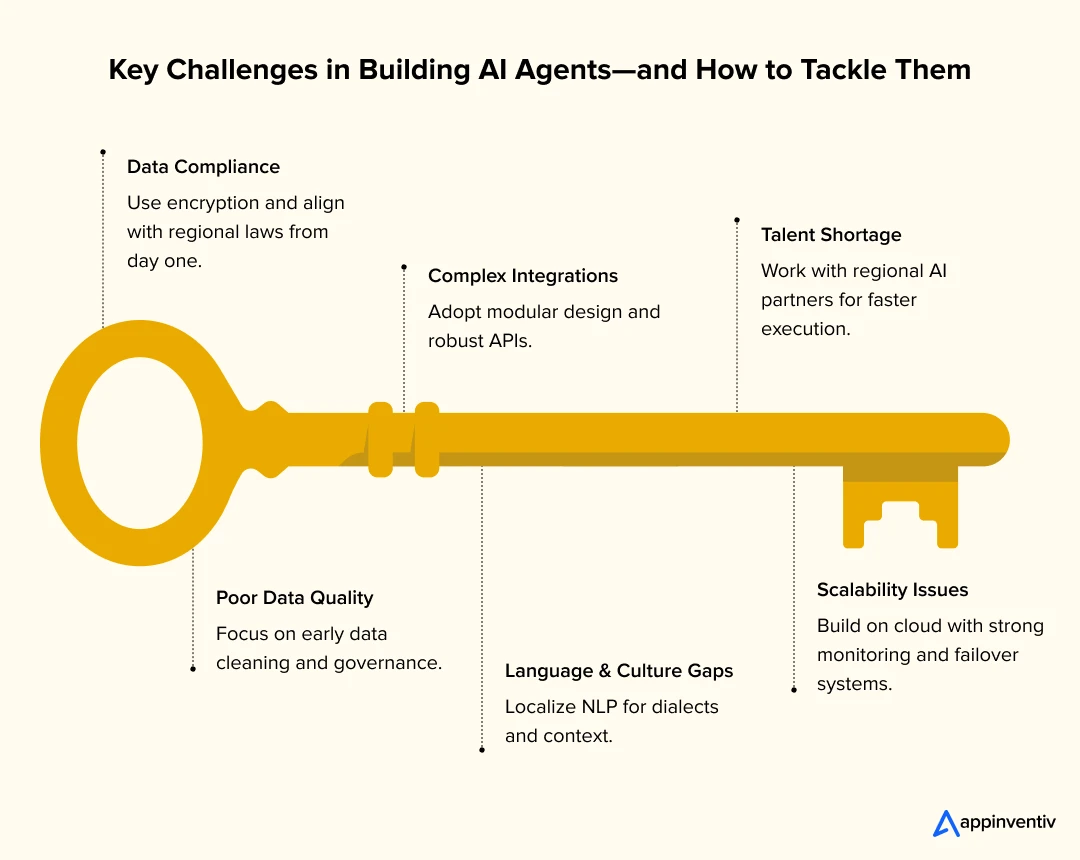
1. Data Privacy and Regulatory Compliance
One of the major challenges associated with AI agent development in the Middle East is data privacy and regulatory compliance. Many Middle Eastern countries like Qatar, Saudi Arabia and more have strict data privacy and security laws that vary across the region. Ensuring your AI agent complies without compromising performance can be difficult.
Solution: Design your AI agents in the Middle Eastern workplace with data protection by default, using encryption and strict access controls. Stay updated on local regulations to maintain compliance while protecting user data.
2. Limited High-Quality Data
AI agents require large, well-structured datasets to perform accurately. Many organizations struggle with fragmented, inconsistent, or incomplete data.
Solution: Prioritize data cleaning, labeling, and augmentation efforts early on. Implement strong data governance to improve data quality and consistency over time.
3. Integration Complexities
Connecting AI agents smoothly with existing legacy systems, CRMs, or multiple platforms can be technically challenging and time-consuming.
Solution: Plan integrations carefully using APIs and modular design to reduce complexity. Focus on building flexible systems that can evolve with your technology stack.
[Also Read: How to Fast-Track Legacy Application Modernization with Artificial Intelligence]
4. Cultural and Language Nuances
Handling multiple languages, dialects, and cultural contexts is essential for AI agents to communicate effectively across the diverse Middle East.
Solution: Customize your natural language processing models for regional languages and cultural nuances. This improves user engagement and trust.
5. Talent Shortage and Skill Gaps
There is a scarcity of AI expertise in the region, making it hard to develop and maintain AI agents internally.
Solution: Collaborate with a dedicated AI development company in Saudi Arabia or across the MENA areas who brings the right skills and local market knowledge. This ensures faster development and ongoing support without heavy internal resource investment.
6. Ensuring Scalability and Reliability
As your AI agent usage grows, it must maintain performance, handle more users, and avoid downtime.
Solution: Build on scalable cloud infrastructure with robust monitoring. Partnering with experienced AI developers can help design architectures that support growth and ensure high availability.
AI Agent Implementation Strategies for Seamless Business Integration
Successfully implementing AI agents requires more than just building smart systems—it demands a well-structured, step-by-step strategy. Below are proven AI agent implementation strategies that can help businesses integrate, scale, and maximize the value of AI agents across their operations.
Proven Strategies for Successful AI Agent Implementation in Business
Define Clear Business Objectives
Start with Pilot Projects
Ensure Data Readiness
Adopt Modular and Scalable Architectures
Prioritize User-Centric Design
Plan for Human-AI Collaboration
Implement Strong Security and Compliance Measures
Develop a Continuous Learning and Improvement Loop
Invest in Employee Training and Change Management
Partner with Experienced AI Development Firms
Define Clear Business Objectives
Start by identifying specific business problems the AI agent should solve. Whether it’s improving customer service or streamlining supply chains, having focused objectives ensures that the AI agent delivers measurable value from day one.
Start with Pilot Projects
Launching a small-scale pilot allows you to test the AI agent’s performance in real-world scenarios. It helps you validate use cases, gather user feedback, and make necessary adjustments before full-scale deployment.
Ensure Data Readiness
High-quality, structured, and accessible data is essential for successful AI agent performance. Prioritize data cleaning, integration, and governance to ensure your AI agent can deliver reliable and accurate outcomes.
Adopt Modular and Scalable Architectures
Build your AI agent using modular and flexible frameworks that can easily integrate with existing enterprise systems. This approach allows your AI agent to scale efficiently across teams, locations, and use cases.
Prioritize User-Centric Design
AI agents should have intuitive, easy-to-use interfaces that encourage adoption by employees and customers. Designing with the end-user in mind improves acceptance, satisfaction, and long-term success.
Plan for Human-AI Collaboration
Integrate AI agents in a way that supports human workflows rather than replaces them. Clearly outline which tasks the AI will handle and which require human intervention to promote seamless collaboration.
Implement Strong Security and Compliance Measures
Make sure your AI agent complies with regional regulations like the UAE and Saudi PDPL. Include encryption, role-based access controls, and audit trails to protect sensitive data and ensure regulatory alignment.
Develop a Continuous Learning and Improvement Loop
AI agents need to evolve with your business. Regularly monitor performance, collect user feedback, and retrain models to keep your AI agent accurate, relevant, and capable of handling new challenges.
Invest in Employee Training and Change Management
Prepare your workforce to collaborate with AI agents by offering training and upskilling opportunities. Building trust and understanding ensures smoother adoption and maximizes your return on AI investment.
Partner with Experienced AI Development Firms
Collaborate with AI specialists who understand your industry and local compliance requirements. Working with an experienced AI consulting company in Dubai can speed up deployment, reduce risks, and ensure your AI agent is both effective and sustainable within the regional regulatory landscape.
After looking into the major AI agent best practices, let’s move on and understand the emerging trends shaping the future of this technology. These trends will not only redefine how AI agents function but also unlock new opportunities and challenges for organizations ready to adapt.
Future Trends Redefining the Power of AI Agents Across the Middle East
AI agents for digital transformation in UAE have evolved from simple task automation tools to strategic enablers of innovation, agility, and growth. Now, staying informed about the role of AI agents in the workplace and their future is essential for organizations aiming to harness their full potential and stay competitive. Let’s look at trends revolutionizing the Agentic AI adoption in Dubai as well as the entire Middle East in detail below:
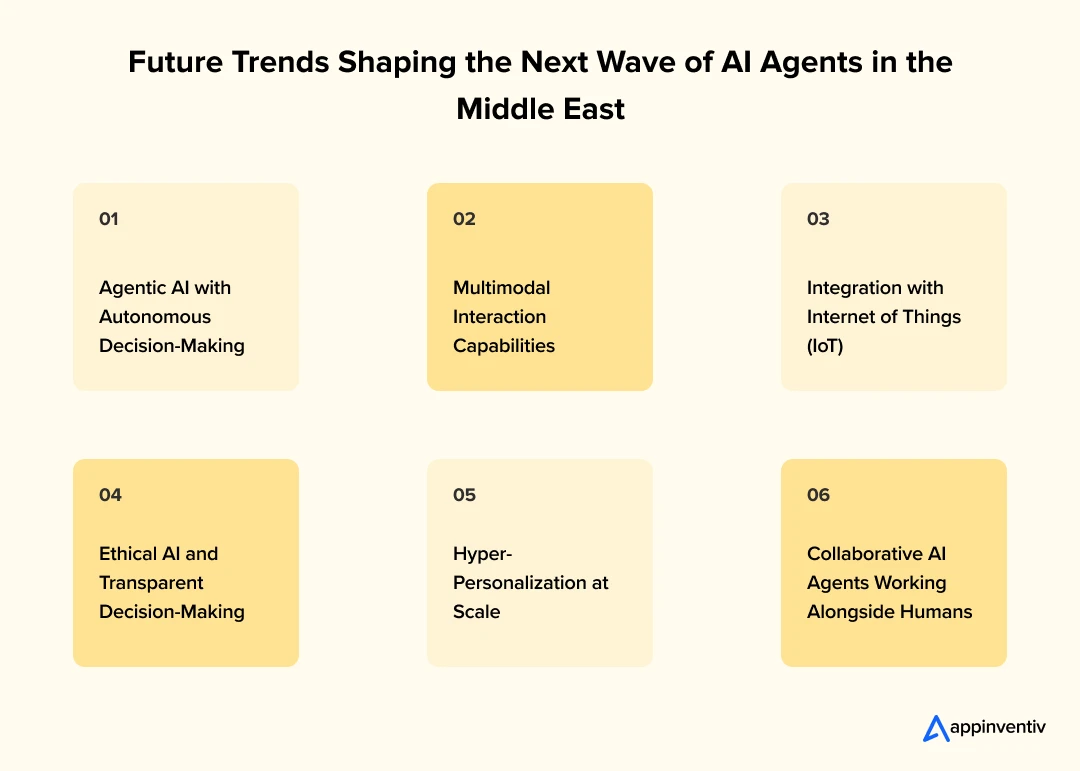 1. Agentic AI with Autonomous Decision-Making
1. Agentic AI with Autonomous Decision-Making
The future of AI agents lies in their ability to act autonomously, not just respond. Agentic AI can independently plan, reason, and execute complex tasks without human intervention. For businesses, this means AI agents can manage end-to-end processes, freeing up leaders to focus on strategy and innovation.
To leverage this trend, companies should invest in building AI systems that learn continuously and can operate with minimal supervision, ensuring they remain effective as business needs evolve.
2. Multimodal Interaction Capabilities
AI agents will increasingly communicate using multiple modes—voice, text, images, and even video—to create richer and more natural interactions. This is particularly important in the Middle East’s diverse cultural and linguistic landscape, where multimodal interfaces can bridge language gaps and improve accessibility.
[Also Read: Multimodal AI – 10 Innovative Applications and Real-World Examples]
Businesses should prioritize developing AI agents that support these diverse communication forms to engage a broader audience and enhance user satisfaction.
3. Integration with Internet of Things (IoT)
AI agents will connect seamlessly with IoT devices, enabling smarter environments—from smart buildings to connected factories. This integration allows AI agents to collect real-time data and make context-aware decisions.
Companies can harness this trend by combining AI with IoT to optimize operations, reduce costs, and deliver proactive services tailored to customer needs.
4. Ethical AI and Transparent Decision-Making
As AI agents take on more responsibility, there will be increasing demand for transparency and ethical behavior in their decisions. To tackle the AI agent challenges, businesses will need to ensure their AI agents operate fairly and explain their reasoning to users and regulators.
To prepare, organizations should adopt transparent AI frameworks and maintain clear audit trails, building trust and meeting regulatory expectations.
5. Hyper-Personalization at Scale
Autonomous AI software agents will enable businesses to deliver highly personalized experiences by analyzing vast amounts of customer data in real-time. This goes beyond simple recommendations to anticipating needs and proactively offering tailored solutions.
Businesses should leverage advanced analytics and AI to create customized journeys that boost loyalty and drive revenue growth.
6. Collaborative AI Agents Working Alongside Humans
Rather than replacing humans, future AI agents will work as collaborators, augmenting human decision-making and creativity. This evolution is not just about automation but about seamless AI workforce integration, where human and digital agents work side by side to maximize efficiency.This requires businesses to rethink workflows and invest in training employees to effectively partner with AI.
Encouraging a culture of collaboration between humans and AI will maximize productivity and innovation.
How Appinventiv is the Right Partner for Developing an AI Agent that Offers It All
We hope this blog has helped you understand the intricacies of AI agents in the Middle East are transforming industries, enhancing customer experiences, and driving operational efficiency. To fully leverage their power and stay ahead in this digital transformation with AI, partnering with a dedicated firm offering AI agent development in the Middle East is the smart choice.
At Appinventiv, we bring deep expertise in building AI agents tailored to the unique needs of Middle Eastern businesses. As a leading AI app development company in Dubai, our team understands that AI development is not just about technology—it requires a strategic approach that aligns with your business goals and the specific challenges of your industry. We focus on delivering solutions that are scalable, secure, and designed to create real impact.
Our experts have extensive experience working with the latest AI technologies, including natural language processing, machine learning, and autonomous decision-making. We ensure your AI agent is trained on quality data and optimized for performance. Beyond development, we offer continuous support and improvement to keep your AI agent effective as your business evolves.
What truly sets us apart is our knowledge of the local market and regulatory environment. We understand the data privacy laws, compliance requirements, and cultural nuances that shape AI adoption in Middle East enterprises. This insight allows us to build AI agents that not only perform well technically but also adhere to regional standards and resonate with your target audience.
By partnering with Appinventiv, you get a custom AI agent designed specifically for your business. Whether it is enhancing customer service, streamlining operations, or driving innovation, we build solutions that empower you to achieve your strategic objectives. Our goal is to help you harness the power of AI agents in digital transformation and maintain a competitive edge in an increasingly digital world.
FAQs
Q. How to build AI agents for enterprises?
A. Building an AI agent begins with a clear understanding of your business goals and the specific challenges you want to solve. It’s essential to identify how the AI agent can add value to your operations and serve your users effectively. The process involves gathering and preparing high-quality data, choosing the right AI models that fit your needs, and designing intuitive interfaces that make interactions seamless.
In the Middle East, it’s especially important to consider local regulations and cultural nuances to ensure compliance and relevance. Partnering with experts who have deep knowledge of the regional market as well as the understanding of the AI automation in the Middle East can make this process smoother. This can help you develop AI agents that are scalable, secure, and tailored to your business objectives.
Q. How will AI agents impact the future of work in the Middle East?
A. AI agents for digital transformation in UAE are revolutionizing the workplace by automating repetitive tasks and enabling smarter, faster decision-making. This shift allows your teams to focus on more strategic and creative work, driving innovation and productivity.
For Middle Eastern businesses, this transformation aligns perfectly with national initiatives like Vision 2030 and Vision 2031, which prioritize digital growth and economic diversification. Adopting AI agents not only enhances operational efficiency but also positions your organization as a forward-thinking leader ready to thrive in an increasingly competitive digital landscape.
Q. Which industries in the Middle East benefit most from AI agents?
A. Several key industries can gain significantly from adopting AI agents in digital transformation including:
Healthcare
AI agents in healthcare help automate patient scheduling, speed up diagnostics, and provide personalized care, improving overall healthcare efficiency.
Finance and Banking
They detect fraud, streamline transactions, and enhance customer support through intelligent automation.
Also Read: AI Agents in Finance for Middle East Banking
Logistics
AI agents optimize delivery routes, manage inventory, and predict demand to ensure faster, cost-effective shipments.
Retail
Agents powered by AI for retail businesses help in personalizing customer experiences, automating inventory tracking, and improving service response times.
Government Services
AI agents speed up public service processes, handle citizen queries, and increase accessibility and transparency.
Q. How do AI agents improve productivity and efficiency in the workplace?
A. AI agents for business transformation in the Middle East can also boost productivity by handling routine tasks and supporting smarter work processes. Key ways they do this include:
Automating repetitive and time-consuming activities to free up employee time
Minimizing human errors through consistent task execution
Delivering real-time data and insights to aid faster, informed decision-making
Allowing employees to focus on strategic, creative, and high-value work
Streamlining workflows for quicker task completion and improved collaboration
Q. How do AI agents integrate with existing enterprise systems?
A. Integration ensures AI agents work smoothly with your current technology environment. Effective integration of AI-driven workforce transformation can be powered by:
Using APIs and middleware to connect AI agents with CRMs, ERPs, databases, and other platforms
Mapping data flows to ensure seamless communication between systems
Designing flexible, modular architectures that support easy updates and scalability
Conducting thorough testing to avoid disruptions during deployment
Collaborating with IT teams to align integration with existing infrastructure and security policies
Q. Are there any compliance or data localization concerns with AI agents in the UAE or KSA?
A. Yes, businesses deploying AI agents in the UAE and Saudi Arabia must comply with several important data privacy and cybersecurity regulations specific to the region:
UAE Personal Data Protection Law (PDPL): This law governs how personal data is collected, processed, stored, and transferred within the UAE, emphasizing data subject rights and consent.
Saudi Arabia Personal Data Protection Law (PDPL): Similar to the UAE’s PDPL, this law regulates data privacy, storage, and cross-border transfers in Saudi Arabia.
Saudi Arabian Monetary Authority (SAMA) Cybersecurity Framework: Applies to financial institutions in Saudi Arabia, outlining strict requirements for data security and risk management.
National Cybersecurity Authority (NCA) Regulations: Provides guidelines for protecting critical infrastructure and data security across sectors in Saudi Arabia.
Q. What are the key considerations for integrating AI agents across legacy enterprise systems in the UAE?
A. Integrating AI agents with legacy systems requires a clear understanding of your current IT setup to ensure smooth and secure connections.
Key points businesses must consider includes:
Assess existing systems to identify integration needs.
Use APIs or middleware for seamless data exchange.
Ensure data security and compliance with UAE laws.
Build flexible solutions that can grow with your business.
Test thoroughly to avoid disruptions during rollout.
Q. What role do AI agents play in the UAE’s smart government strategy?
A. AI agents are a key enabler of the UAE’s smart government strategy, supporting faster, more accessible, and citizen-centric public services. They help automate routine government processes like visa applications, bill payments, and form submissions, providing 24/7 multilingual support and real-time updates to residents. By reducing manual workloads, improving response times, and ensuring seamless digital experiences, AI integration in government services in the UAE contribute directly to the nation’s vision of building a fully connected, efficient, and transparent government.
Q. Can AI agents be integrated with ERP or CRM systems in government and large enterprises?
A. Yes, AI agents can be effectively integrated with ERP and CRM systems in both government entities and large enterprises to streamline workflows, automate data management, and enhance customer or citizen engagement. Using APIs, middleware, and modular architectures, businesses and public sector organizations can ensure smooth communication between AI agents and existing enterprise platforms. This integration allows AI agents to access real-time data, automate tasks like data entry and reporting, and provide smarter, context-aware interactions.


- In just 2 mins you will get a response
- Your idea is 100% protected by our Non Disclosure Agreement.
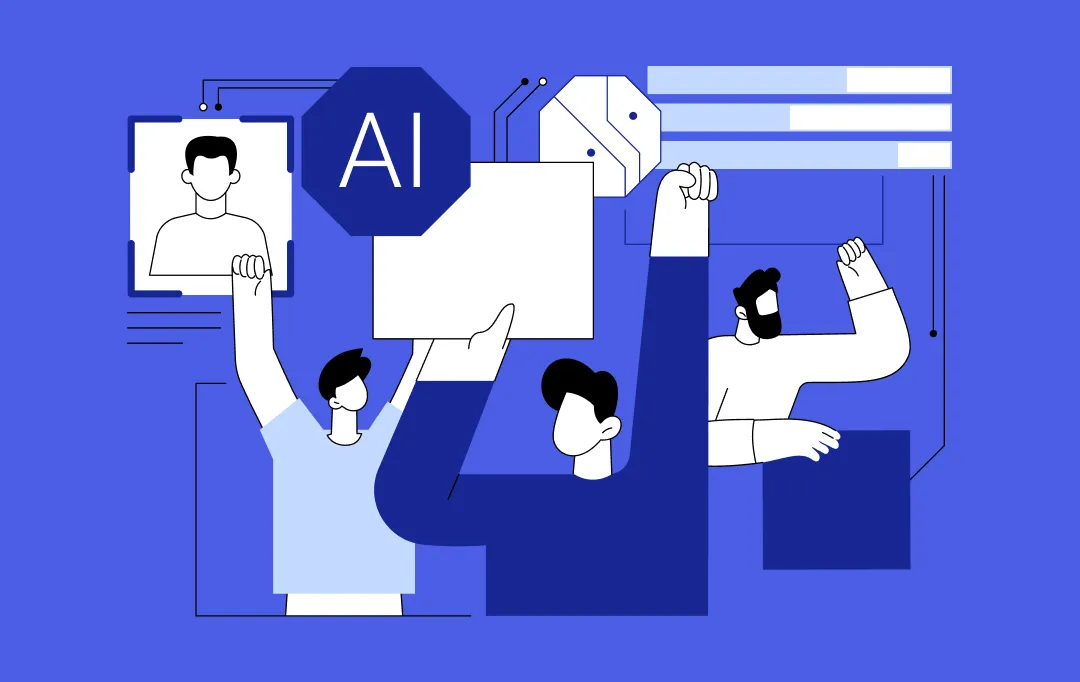
Beyond the Hype: Practical Generative AI Use Cases for Australian Enterprises
Key takeaways: Enterprises in Australia are adopting Gen AI to address real productivity gaps, particularly in reporting, analysis, and service delivery. From banking and pharmaceutical to mining and agriculture, Gen AI is applied across industries to modernise legacy systems and automate knowledge-intensive and documentation-heavy workflows. The strongest outcomes appear where Gen AI is embedded into…
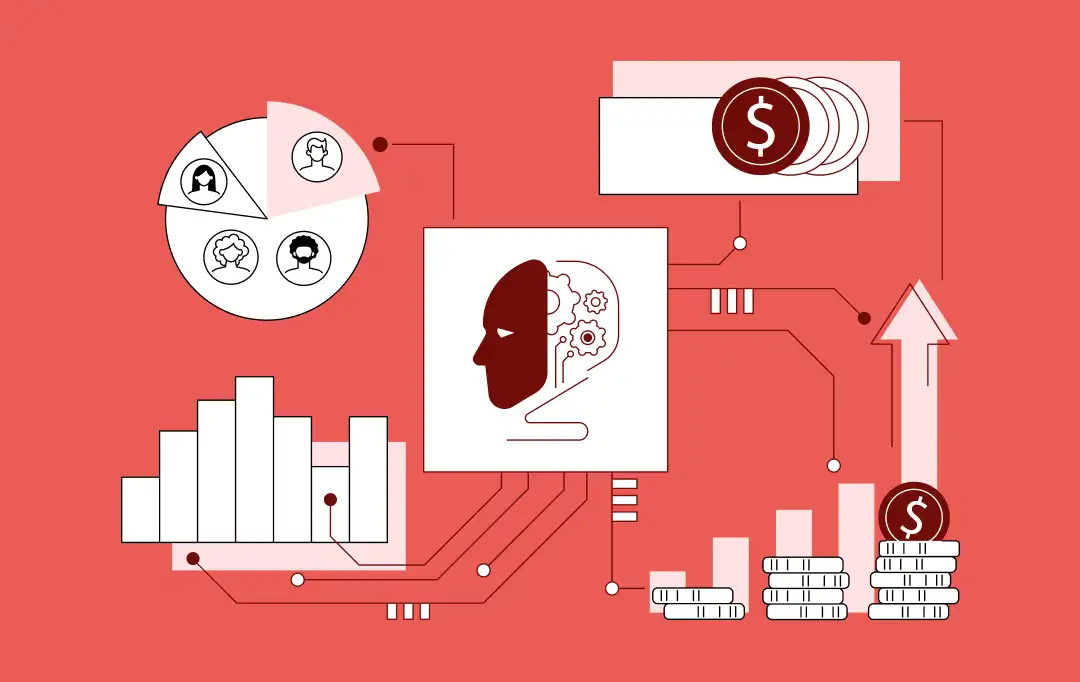
The ROI of Accuracy: How RAG Models Solve the "Trust Problem" in Generative AI
Key takeaways: RAG models in generative AI attach real, verifiable sources to model outputs, which sharply cuts hallucinations and raises user confidence. Accuracy directly impacts ROI, driving fewer escalations, faster decision cycles, and lower support costs. RAG vs fine-tuning: RAG allows real-time updates without retraining, offering faster deployment and lower maintenance. Vector databases for RAG…
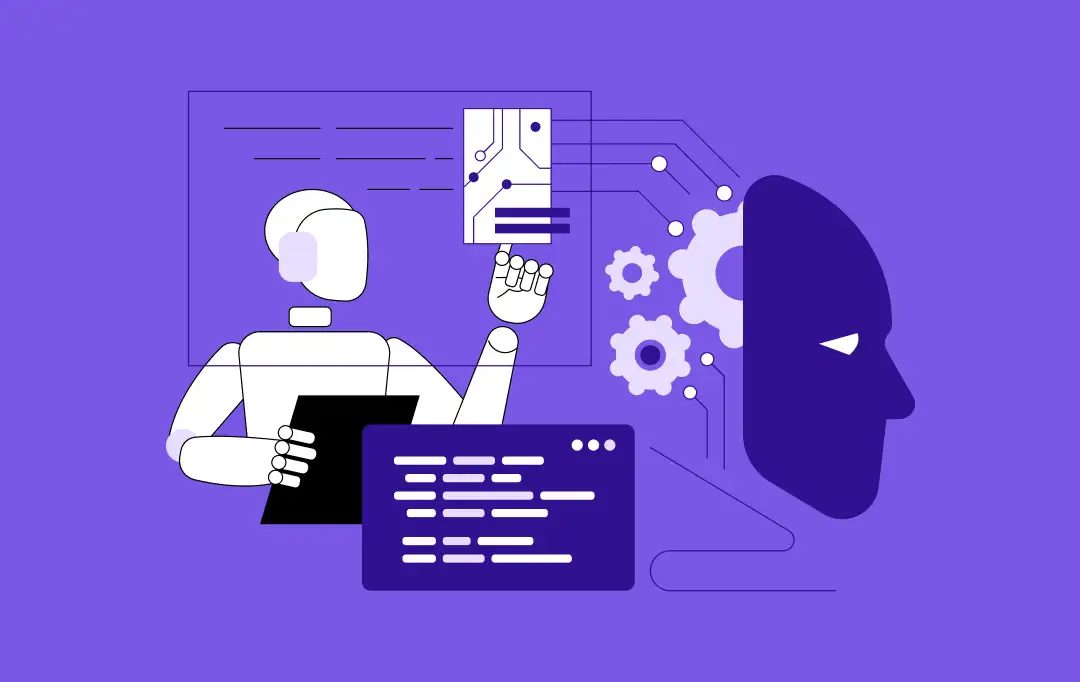
How to Build AI Agents for Insurance - Framework, Use Cases & ROI
Key takeaways: AI agents are moving insurance operations beyond pilots into scalable, regulatory-compliant AI in insurance production-grade systems. Enterprise-ready AI agents require governance-first frameworks, hybrid architectures, and deep integration with core systems. ROI compounds through reduced cycle times, improved decision consistency, and non-linear operational scalability. Insurers succeeding with AI agents treat them as operational infrastructure,…























